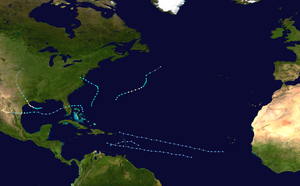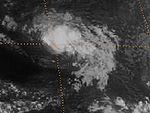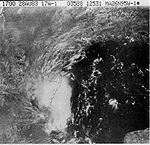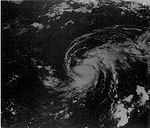1983 Atlantic hurricane season
| 1983 Atlantic hurricane season | |
|---|---|

Season summary map
|
|
| Seasonal boundaries | |
| First system formed | July 23, 1983 |
| Last system dissipated | September 30, 1983 |
| Strongest storm | |
| Name | Alicia |
| • Maximum winds | 115 mph (185 km/h) (1-minute sustained) |
| • Lowest pressure | 963 mbar (hPa; 28.44 inHg) |
| Seasonal statistics | |
| Total depressions | 7 |
| Total storms | 4 |
| Hurricanes | 3 |
| Major hurricanes (Cat. 3+) |
1 |
| Total fatalities | 22 |
| Total damage | $2.6 billion (1983 USD) |
| Related article | |
| Tropical depression (SSHWS) | |
| Duration | July 23 – July 28 |
|---|---|
| Peak intensity | 35 mph (55 km/h) (1-min) |
| Tropical depression (SSHWS) | |
| Duration | July 27 – August 2 |
|---|---|
| Peak intensity | 35 mph (55 km/h) (1-min) |
| Category 3 hurricane (SSHWS) | |
| Duration | August 15 – August 21 |
|---|---|
| Peak intensity | 115 mph (185 km/h) (1-min) 962 mbar (hPa) |
| Category 1 hurricane (SSHWS) | |
| Duration | August 23 – August 29 |
|---|---|
| Peak intensity | 80 mph (130 km/h) (1-min) 986 mbar (hPa) |
| Category 1 hurricane (SSHWS) | |
| Duration | September 10 – September 15 |
|---|---|
| Peak intensity | 75 mph (120 km/h) (1-min) 994 mbar (hPa) |
| Tropical depression (SSHWS) | |
| Duration | September 19 – September 21 |
|---|---|
| Peak intensity | 35 mph (55 km/h) (1-min) |
| Tropical storm (SSHWS) | |
| Duration | September 26 – September 30 |
|---|---|
| Peak intensity | 65 mph (100 km/h) (1-min) 999 mbar (hPa) |
The 1983 Atlantic hurricane season was the least active Atlantic hurricane season in 53 years, during which only four tropical storms formed. The season officially began on June 1, 1983, and lasted until November 30, 1983. These dates conventionally delimit the period of each year when most storms form in the Atlantic basin. The season had very little activity, with only seven tropical depressions, four of which reached tropical storm strength or higher. This led to the lowest Accumulated Cyclone Energy count since 1950, but not since 1900.
The season began later than normal; the first tropical depression formed on July 29 and the second on July 31. Neither tropical depression strengthened and they dissipated soon thereafter. Hurricane Alicia formed as Tropical Depression Three on August 15, quickly intensified into a hurricane on August 16 and made landfall in Texas on August 18. Alicia caused over $3 billion in damage in Texas. Hurricane Barry formed on August 25, crossed Florida and strengthened into a hurricane. Barry made landfall near Brownsville, Texas, and dissipated over land on August 30.
Hurricane Chantal, the third of three hurricanes in 1983, formed on September 10. It strengthened into a hurricane, but stayed out at sea, and became absorbed by a front on September 15. Tropical Depression Six formed on September 19 and caused heavy rains in the Caribbean before degenerating into a wave on September 21. Tropical Storm Dean was the final storm of the season, forming on September 26. It originally tracked to the north, peaking at 55 mph (89 km/h) winds (85 km/h), and made landfall in the Delmarva Peninsula on September 29. It dissipated over the coast of Virginia on September 30.
Forecasts of hurricane activity are issued before each hurricane season by noted hurricane experts like Dr. William M. Gray, and his associates at Colorado State University. A normal season, as defined by NOAA, has six to fourteen named storms, with four to eight of those reaching hurricane strength, and one to three major hurricanes. The July 23, 1983, forecast predicted that after the slow start to the season, that a total of eight storms would form, and five of the storms would reach hurricane status. The forecast did not specify how many of the hurricanes would reach major hurricane status. However, the predictions proved to be too high, with only four named storms forming by the end of the season and three of those reaching hurricane status.
...
Wikipedia











